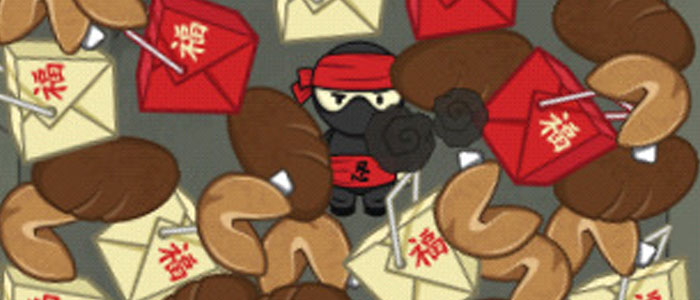With the recent onslaught of ninja-themed iPhone games, it’s quite the challenge to devise a gameplay mechanic that seems fresh and unique. Molecube has at least accomplished this much. Binja is not a typical hack and slash action game.
Binja asks the player to “slash” as many identical Asian cuisine related debris as possible without colliding with any non-matching debris. It’s nothing groundbreaking, but it’s clever. As a gameplay mechanic, it has potential. Pulling off a particularly long combo can feel particularly satisfying, and the physics provide an element of unpredictability to the game play.
Unfortunately, most of the time spent playing Binja turns into an exercise in frustration. Even with a fairly helpful tutorial, the controls are difficult to figure out the first few tries, simply because they don’t seem to be as responsive as they should be. For a ninja, this game’s protagonist is awfully sluggish, moving as if he’s trapped in a vat of soy sauce.
Speaking of soy sauce, the player’s ninja is for some reason unable to keep slashing without a steady supply of the condiment, which they must constantly seek out. This mechanic does little more than bring games to an arbitrary standstill just as the player was beginning to get the hang of things. Because of this, the player almost never feels that they’ve had the chance to grasp the game itself, and the prospect of repeatedly topping ones’ own score begins to feel increasingly like a burdensome chore.
There are three power-ups that can be earned by the player to help them in the process, but even these (except for the relatively uninspired “stop time”) tend to feel ineffective and pointless. One power-up increases the size of the ninja and makes him stronger. Theoretically this makes it easier for him to make his way around the screen to collect soy sauce or set up another great combo. Unfortunately, by the time the player has to go looking for the soy sauce, his game is about to be over anyway. Another power-up shifts gravity, causing all the debris to float to the top. For the life of me, I have yet to find a consistently helpful way to use this.
Is Binja worth .99 cents in a void? Certainly. But in the context of the app store, where a number of fun and flawlessly executed games cost the same amount, it just doesn’t make sense. It’s a pretty good game on its’ face, but the sluggish controls and odd game design decisions (not to mention the lack of even a local leaderboard) make this a difficult game to recommend.
Note: At the time of this review, the game contained a bug that causes the game to freeze up after random games end, requiring the player to turn their iPhone off and on before the game will work again. The developers have submitted an update that will remedy this problem in the future.
Review copy provided by publisher.
